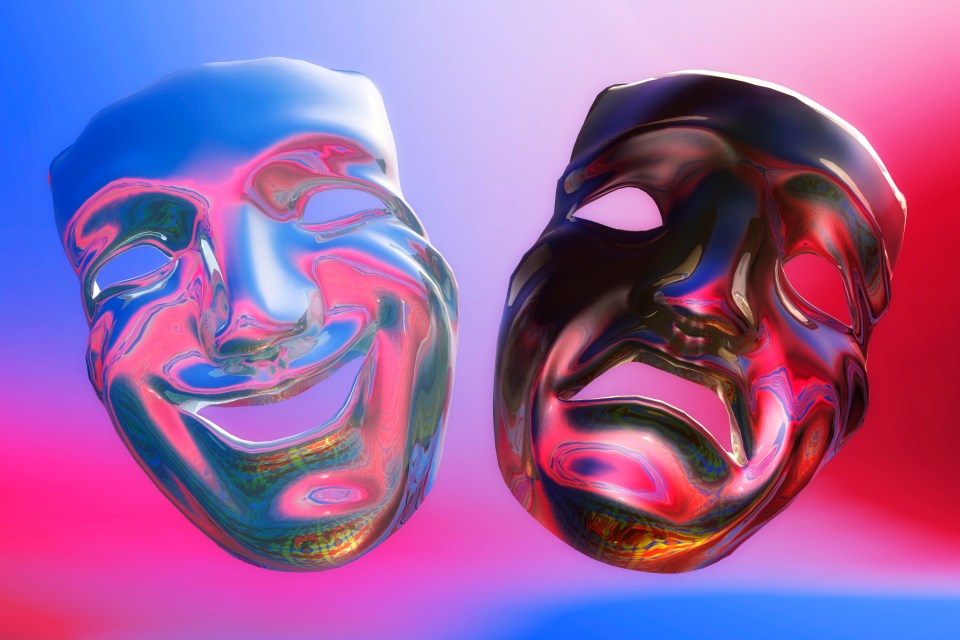“No man, for any considerable period, can wear one face to himself and another to the multitude, without finally getting bewildered as to which may be the true.”
― Nathaniel Hawthorne, The Scarlet Letter
“We all wear masks, and the time comes when we cannot remove them without removing some of our own skin.”
― André Berthiaume
I picked up a book, today, titled the Mask of Masculinity by Lewis Howes. I picked it up in response to my frustration with some of the men in my life. I wanted to know if, perhaps, by better understanding the plight of today’s manly man, I might cultivate more compassion. Maybe if I could see what hardships they face, I could better figure out a solution (or at least figure out how not to be part of the problem).
In this particular book, if you’re curious, the author lays out nine masks that men commonly reach for as a suit of armor to mask their vulnerability.
- The stoic mask: “I will work my ass off…and will never let you see me sweat.”
- The athlete mask: “I am faster, stronger, better…and I refuse to lose!”
- The material mask: “My net work is my self worth”
- The sexual mask: “Relationships are for pansies. Sex is for conquerers”
- The aggression mask: “All men are aggressive. It’s in their nature.”
- The joker mask: “Humor is my weapon … and my shield.”
- The invincible mask: “I don’t think about consequences. I show no fear.”
- The know-it-all mask: “Yeah, yeah, yeah. I know…”
- The alpha mask: “There are winners and losers. I’m a winner.”
I have only gotten through the first part of the book (just enough to know where he plans on taking me). But what I am finding interesting so far is that this is not only helping me to understand some of the men in my life…but it’s also giving me a bit of a glimpse into my own struggles with my own masks.
I look around me and yes…it’s true. Many men tell me of the challenge of trying to speak with me about emotional jargon when they have been raised their whole lives to dodge that bullet like their lives depended on it.
But some of those masks above also resonated with me. As a highly sensitive person…who feels things intensely and is easily over-stimulated…I’ve still had to make a living. I still have to engage in social gatherings that are not necessarily HSP-friendly.
To do that, successfully, I have needed to develop any number of masks. Some suits of armor. And as I started reading this book, I started thinking about my own personal masks. I’m pretty sure I have more than nine. But some of the ones that I identified with were:
- Perfectionism (Brene Brown speaks on this one beautifully in her book The Gift of Imperfection)
- The Stoic – Trust me…I’ll never let you see me break a sweat if I can help it.
- The Nice Girl – I would be happy to help you! (pay no attention to the teeth grinding you hear. That’s your imagination)
- The Athlete – Marathons anyone? I can run circles around you.
- The Know-it-All Mask – Ahhh academia. Such a nice neutral, and safe space to play in.
- The Lone Wolf – I don’t need anyone. I’m fine. (Never mind that wolves are pack animals)
You’ll notice that a couple of mine in there are really similar to those Lewis Howes talks about.
So, apparently, in an effort to fit into a world that is not only highly stimulating…but also highly masculine in particular…I have started to take on a few of the masks that men have used to reduce their exposure to emotional risk. Why wouldn’t I take some of them on? I’m already putting on a mask. If I want to appear strong…Why not reach for the masks of the dominant culture?
In the year 2017 (and maybe a bit before it) I made it my mission to try my best to strip off some of the masks I hide behind. I wanted to begin exploring what it might be like if I stopped trying so hard to be liked, and pushed harder to be known, instead.
I knew it would be important work. I just don’t think I realized how painful it would be. Because in wearing the masks…I was safe. It was easy for people to love me. And if they didn’t love me….who cares? It’s not me they were rejecting, anyway, right?
But now? It’s becoming less easy. I can sense it. The friction.
I am starting to say “wait…maybe I’m not so stoic. Maybe I need help.” There are some who are answering the call and saying “Sweet! So glad you called!” At that point, I am flooded with emotions. Gratitude, for one. Followed by fear. Fear that I will be too much. That my needs will be too much. And when I am met with warm compassion…there is the fear that maybe I don’t deserve it. It’s beautiful and wonderful…but terrifying.
Then there are the others. Those who are standing back saying “Huh? What do you mean you have needs? Who ARE you?” They look betrayed. Like I sold them a bill of goods…an independent woman. A rational woman. And perhaps it was all a lie. Those are painful not because it stirs up ambivalence. But because it reaffirms the original purpose of the mask. It says to me “maybe I should go ahead and put that mask back on. Life was easier, there.”
Without a doubt…the hardest mask to push away is the “Nice” mask. The mask that says to the world “It’s okay that you walk all over me. How can I help you?” It’s the mask that says “I’m sorry…for being here. In the way. Sorry for breathing in too much of the air here. How can I compensate?” It’s the mask that says “No! Don’t worry! I won’t hold you accountable to your actions. Everything is fine! Everything is beautiful! YOU are beautiful!”
When I remove it, a part of me gets a thrill as a watch people in a room quiet down. They listen in. Some people see me stand firm and say “there she is! I was wondering when you’d finally join us.” Those people confuse me. How can they still want me around when I just made them feel uncomfortable? Why do they trust me to wield this power? I don’t even trust myself yet with it.
The others simply run away or bite back. Hard. Whereas I was a neutral party. Now I am an adversary. Whether they fight or flee, however, my experience is the same. Pain.
Perhaps that is what Bertheaume meant when she warned us that in removing our long-worn masks…we will find we cannot avoid taking off a layer of skin along with it. For when we wear our emotional masks for a long enough time, it can feel like a part of who we are. That kind of exposure…it’s not for the faint of heart.
What masks do you where? And what strategies have worked well for you when experimenting with removing them?

